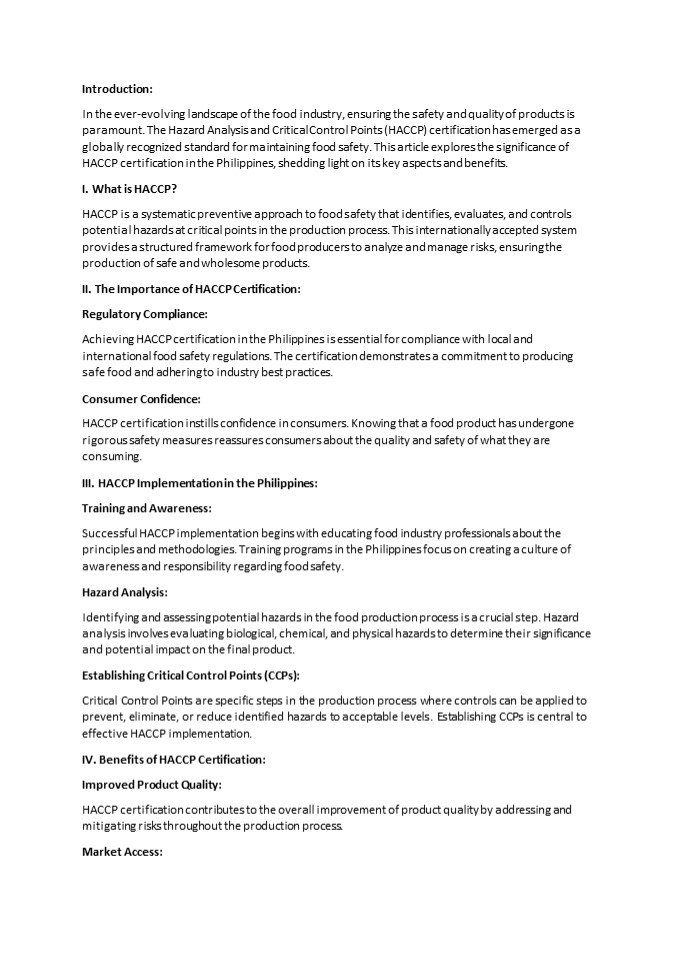haccp certification philippines - PowerPoint PPT Presentation
Title:
haccp certification philippines
Description:
HACCP is abbreviated as Hazard Analysis Critical Control Points. It is a technique that is accepted internationally for preventing biological, chemical, and physical hazards in the food safety system. The HACCP technique helps to establish critical control points, set critical limits, ensure control measures as well as identify the risks for reducing the food safety hazards. – PowerPoint PPT presentation
Number of Views:1
Title: haccp certification philippines
1
- Introduction
- In the ever-evolving landscape of the food
industry, ensuring the safety and quality of
products is paramount. The Hazard Analysis and
Critical Control Points (HACCP) certification has
emerged as a globally recognized standard for
maintaining food safety. This article explores
the significance of HACCP certification in the
Philippines, shedding light on its key aspects
and benefits. - What is HACCP?
- HACCP is a systematic preventive approach to food
safety that identifies, evaluates, and controls
potential hazards at critical points in the
production process. This internationally accepted
system provides a structured framework for food
producers to analyze and manage risks, ensuring
the production of safe and wholesome products. - The Importance of HACCP Certification
- Regulatory Compliance
- Achieving HACCP certification in the Philippines
is essential for compliance with local and
international food safety regulations. The
certification demonstrates a commitment to
producing safe food and adhering to industry best
practices. - Consumer Confidence
- HACCP certification instills confidence in
consumers. Knowing that a food product has
undergone rigorous safety measures reassures
consumers about the quality and safety of what
they are consuming. - HACCP Implementation in the Philippines
- Training and Awareness
- Successful HACCP implementation begins with
educating food industry professionals about the
principles and methodologies. Training programs
in the Philippines focus on creating a culture of
awareness and responsibility regarding food
safety. - Hazard Analysis
- Identifying and assessing potential hazards in
the food production process is a crucial step.
Hazard analysis involves evaluating biological,
chemical, and physical hazards to determine their
significance and potential impact on the final
product. - Establishing Critical Control Points (CCPs)
- Critical Control Points are specific steps in the
production process where controls can be applied
to prevent, eliminate, or reduce identified
hazards to acceptable levels. Establishing CCPs
is central to effective HACCP implementation. - Benefits of HACCP Certification
- Improved Product Quality
- HACCP certification contributes to the overall
improvement of product quality by addressing and
mitigating risks throughout the production
process.
2
HACCP certification enhances a company's
marketability by facilitating access to
international markets that require stringent food
safety standards. Reduced Risk of Foodborne
Illness Implementing HACCP significantly reduces
the risk of foodborne illnesses, protecting both
consumers and the reputation of food
businesses. Conclusion In the Philippines, HACCP
certification Philippines serves as a cornerstone
for ensuring the safety and quality of food
products. As the food industry continues to
evolve, businesses that prioritize HACCP
certification not only comply with regulations
but also gain a competitive edge by fostering
consumer trust and delivering products of the
highest standard. Embracing HACCP principles is
not just a regulatory requirement it is a
commitment to excellence in food safety and
quality.































